DSS诱导结肠炎造模教学及不同分子量的应用异同点
2025-08-05 来源:本站 点击次数:41
DSS?结肠炎造模的经典化合物!
然鹅,DSS 分子量多变:太小,诱导的炎症较轻;太大,则难以穿透肠黏膜。
小小 DSS 诱导疾病造模也是大有门道儿,快来随小 M 一起来看看吧~
Section.01
DSS 诱导结肠炎模型
DSS:
硫酸葡聚糖钠盐 (Dextran sulfate sodium salt),是一种水溶性的带负电荷的硫酸化多糖,葡聚糖的聚阴离子衍生物,分子量高度可变,不同分子量的 DSS 具有不同的生物活性,常见的 DSS 分子量为 5,000-550,000 Da。
研究结肠炎的小伙伴们可能都知道,DSS 是经典的结肠炎造模的化合物,可用于诱发急性/慢性结肠炎/结肠炎相关的结肠癌模型。Butttttt!DSS 分子量过小,诱导的炎症较轻,分子量过大,则难以穿透肠黏膜。
目前最为常用的,是在饮用水中添加一定浓度的 DSS (分子量 36,000-50,000 Da),其诱导的小鼠结肠炎较为严重,且与人类溃疡性结肠炎最为相似。
言而总之,总而言之,使用 DSS (36,000-50,000 Da) 诱导结肠炎模型快速、简便、具有可重复和可控性,因而在炎症性肠病 (BD) 研究中非常流行。此外,通过改变 DSS 的浓度和给药周期及频率,或与其他药物联用,可实现急性/慢性肠道炎症、结肠炎相关的结肠癌模型的造模[1]。
小 M 为大家整理了使用 DSS (36,000-50,000 Da) 诱导疾病模型的原理、方案和检测验证指标,大家可自行参考喔~
DSS (36,000-50,000 Da) 造模原理、方案和检测


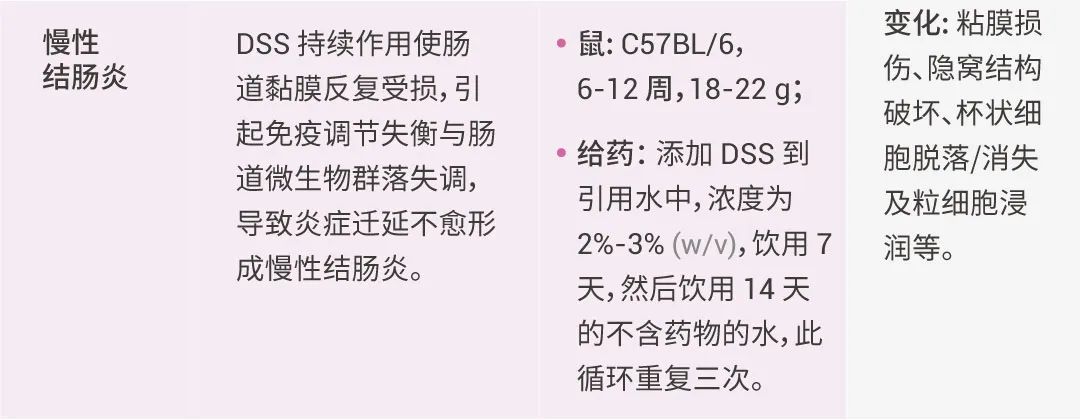
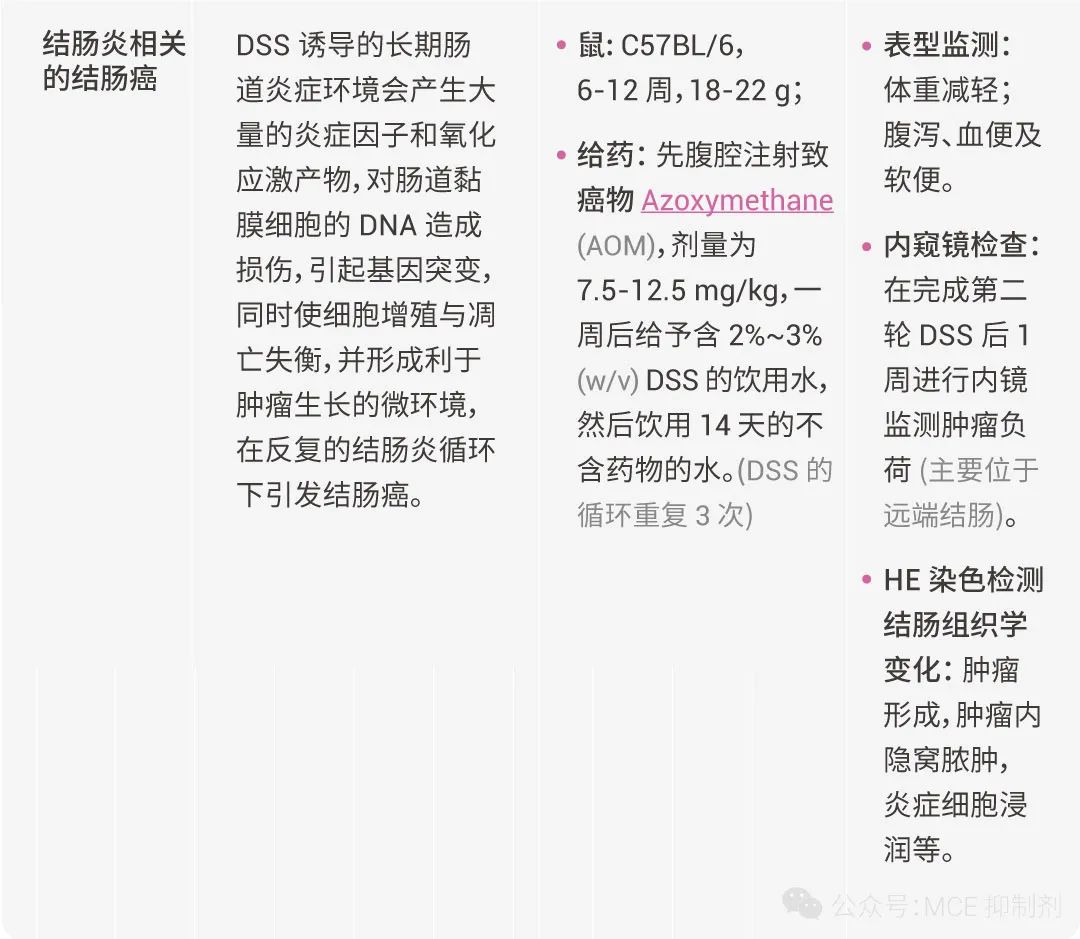
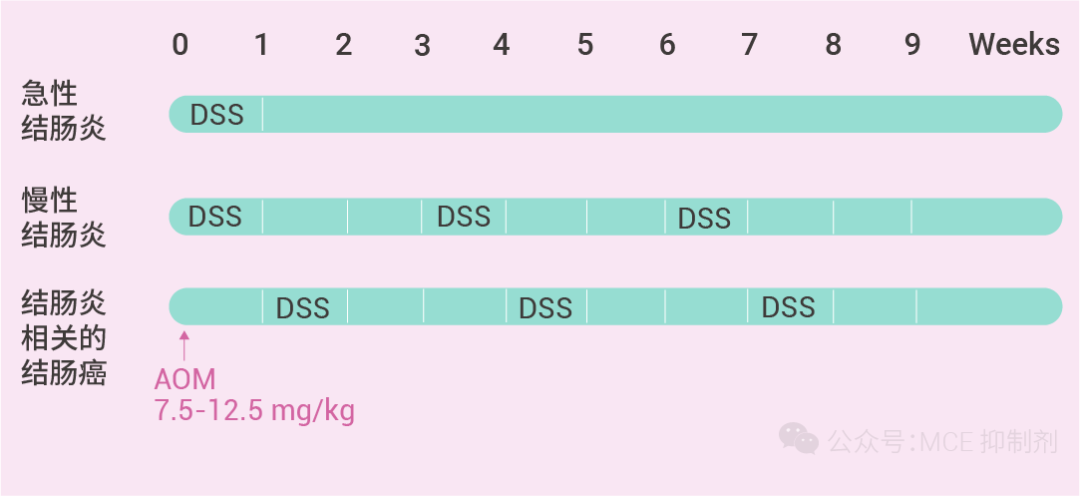 图 1. DSS (36,000-50,000 Da) 诱导不同结肠炎模型的实验周期[2][3][4][5][6[7]。
图 1. DSS (36,000-50,000 Da) 诱导不同结肠炎模型的实验周期[2][3][4][5][6[7]。
Section.02
DSS 造模: 注意事项有哪些?
造模归造模,热乎劲上来了也要先看完这七大注意事项哇,宝子们!!!
造模小贴士
日常换水:建议每 1-2 天更换含 DSS 的饮用水,饮水量可以按照小鼠每天 7-10 mL,大鼠每天 11 mL/100 g 体重来计算,并检查水瓶无堵塞、漏液发生。
做好记录:每日记录饮水量、确认饮水量是否正常,记录体重以及疾病表型,病理切片建议取肛门附近 1-2 cm 段。
预实验:DSS 溶液的浓度、动物的种类和品系可能都会影响造模效果,建议通过预实验确定造模最佳浓度。
诱发年龄:成功且易于重复地诱发 DSS 结肠炎的最佳年龄范围为 6-8 周,雄鼠可能比雌鼠更敏感。
动物管理:为了减小饮水量差异,并更清楚地观察造模进展,建议每个笼子 2-3 只动物,每笼不超过 5 只动物。
DSS 分子量:有研究表明,36,000-50,000 Da 是建立结肠炎模型的最佳 DSS 分子量范围。DSS 分子量过低,会导致炎性作用较弱,而分子量过大会导致吸收越困难[8][9]。
AOM 剂量:根据实验室、小鼠设施和小鼠背景的不同,AOM 的影响可能有所不同。建议使用不同剂量的 AOM (7.5-12.5 mg/kg) 进行预实验。AOM 导致的死亡通常在注射后 24 至 72 小时内观察到。
Section.03
MCE 实验验证
实验方案
实验结果
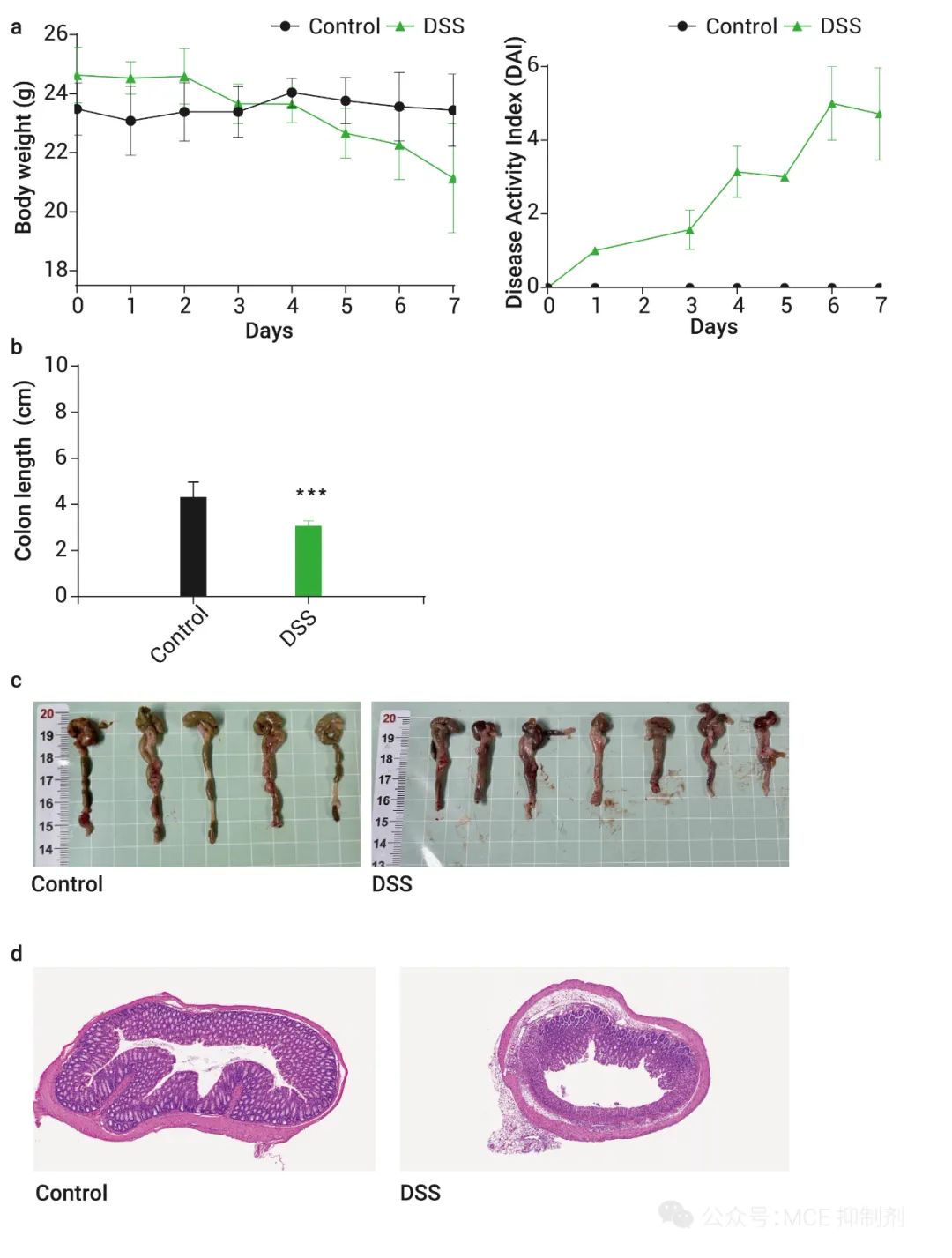 图 2. DSS (2%, 饮用水,7 天) 诱导急性结肠炎模型。
图 2. DSS (2%, 饮用水,7 天) 诱导急性结肠炎模型。
A.7 天内的体重变化,7 天后体重减轻约 20%。B. 疾病活跃指数评分。C. 7 天后取结肠,并测量结肠长度,结果显示结肠缩短。D. 结肠拍照。E. 远端结肠 HE 染色,结果显示重度炎症,炎症浸润到黏膜下层并透壁,隐窝丢失大于 1/3,杯状细胞丢失。
Section.04
其他分子量的 DSS
看到这里,想必大家都已经记住了造结肠炎模型用的是 DSS(36,000-50,000 Da),那么其他分子量的 DSS 又有什么用途呢? (更多信息参考可登录MCE 官网查询~)
不同分子量 DSS 的常见应用

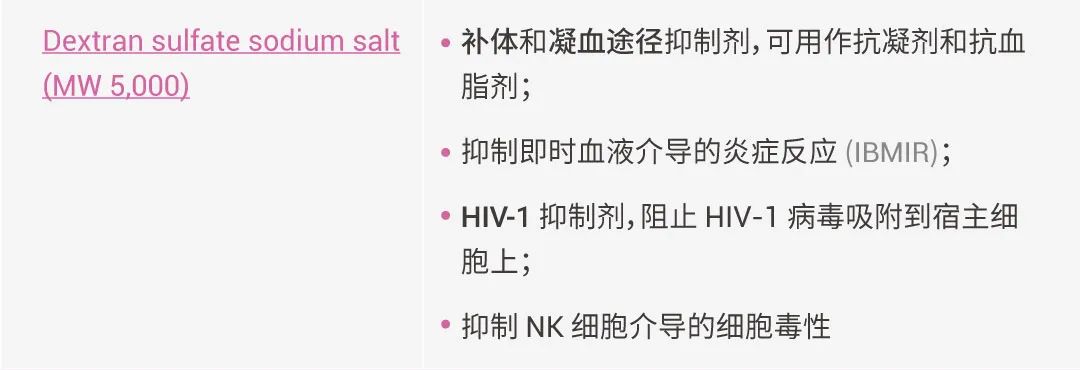



不同分子量 DSS 的用途比较






Section.05
小结
今天小 M 给大家提供了保姆式结肠炎造模教学,还顺便给大家整理了不同分子量的应用异同点。如果觉得这篇干货秘籍有帮助,别忘了收藏,点赞、分享哦~
产品推荐
Dextran sulfate sodium salt (MW 35,000-45,000) (HY-116282C)
结肠炎造模试剂。
Dextran sulfate sodium salt (MW 5,000) (HY-116282)
抗凝剂,补体抑制剂。
Azoxymethane (AOM) (HY-111375)
结肠致癌物质,可与 DSS 联用造结肠癌模型。

[1] Chassaing B, et al. Dextran sulfate sodium (DSS)-induced colitis in mice. Curr Protoc Immunol. 2014 Feb 4;104:15.25.1-15.25.14.
[2] Kinchen J, et al. Structural Remodeling of the Human Colonic Mesenchyme in Inflammatory Bowel Disease. Cell. 2018 Oct 4;175(2):372-386.e17.
[3] Zhang H, et al. Biochanin a ameliorates DSS-induced ulcerative colitis by improving colonic barrier function and protects against the development of spontaneous colitis in the Muc2 deficient mice. Chem Biol Interact. 2024 May 25;395:111014.
[4] Dokoshi T, et al. Dermal injury drives a skin to gut axis that disrupts the intestinal microbiome and intestinal immune homeostasis in mice. Nat Commun. 2024 Apr 8;15(1):3009.
[5]. Wirtz S, et al. Chemically induced mouse models of intestinal inflammation. Nat Protoc. 2007;2(3):541-6.
[6]. Zhu H, et al. RNA virus receptor Rig-I monitors gut microbiota and inhibits colitis-associated colorectal cancer. J Exp Clin Cancer Res. 2017 Jan 5;36(1):2.
[7] Parang B, et al. AOM/DSS Model of Colitis-Associated Cancer. Methods Mol Biol. 2016;1422:297-307.
[8] Kitajima S, et al. Histological analysis of murine colitis induced by dextran sulfate sodium of different molecular weights. Exp Anim. 2000 Jan;49(1):9-15.
[9] Lu G, et al. Dextran Sulfate Protects Pancreatic β-Cells, Reduces Autoimmunity, and Ameliorates Type 1 Diabetes. Diabetes. 2020 Aug;69(8):1692-1707.

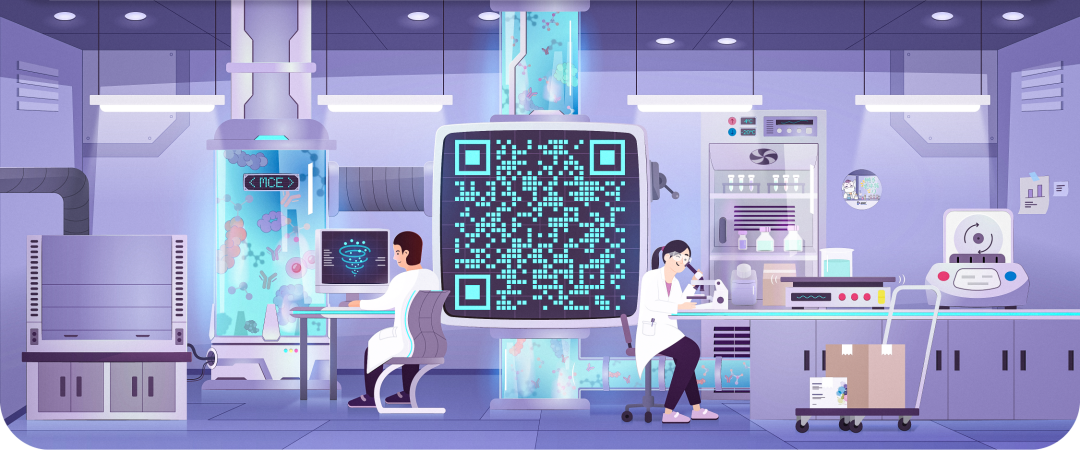
然鹅,DSS 分子量多变:太小,诱导的炎症较轻;太大,则难以穿透肠黏膜。
小小 DSS 诱导疾病造模也是大有门道儿,快来随小 M 一起来看看吧~
Section.01
DSS 诱导结肠炎模型
DSS:
硫酸葡聚糖钠盐 (Dextran sulfate sodium salt),是一种水溶性的带负电荷的硫酸化多糖,葡聚糖的聚阴离子衍生物,分子量高度可变,不同分子量的 DSS 具有不同的生物活性,常见的 DSS 分子量为 5,000-550,000 Da。
研究结肠炎的小伙伴们可能都知道,DSS 是经典的结肠炎造模的化合物,可用于诱发急性/慢性结肠炎/结肠炎相关的结肠癌模型。Butttttt!DSS 分子量过小,诱导的炎症较轻,分子量过大,则难以穿透肠黏膜。
目前最为常用的,是在饮用水中添加一定浓度的 DSS (分子量 36,000-50,000 Da),其诱导的小鼠结肠炎较为严重,且与人类溃疡性结肠炎最为相似。
言而总之,总而言之,使用 DSS (36,000-50,000 Da) 诱导结肠炎模型快速、简便、具有可重复和可控性,因而在炎症性肠病 (BD) 研究中非常流行。此外,通过改变 DSS 的浓度和给药周期及频率,或与其他药物联用,可实现急性/慢性肠道炎症、结肠炎相关的结肠癌模型的造模[1]。
小 M 为大家整理了使用 DSS (36,000-50,000 Da) 诱导疾病模型的原理、方案和检测验证指标,大家可自行参考喔~
DSS (36,000-50,000 Da) 造模原理、方案和检测




 图 1. DSS (36,000-50,000 Da) 诱导不同结肠炎模型的实验周期[2][3][4][5][6[7]。
图 1. DSS (36,000-50,000 Da) 诱导不同结肠炎模型的实验周期[2][3][4][5][6[7]。Section.02
DSS 造模: 注意事项有哪些?
造模归造模,热乎劲上来了也要先看完这七大注意事项哇,宝子们!!!
造模小贴士
日常换水:建议每 1-2 天更换含 DSS 的饮用水,饮水量可以按照小鼠每天 7-10 mL,大鼠每天 11 mL/100 g 体重来计算,并检查水瓶无堵塞、漏液发生。
做好记录:每日记录饮水量、确认饮水量是否正常,记录体重以及疾病表型,病理切片建议取肛门附近 1-2 cm 段。
预实验:DSS 溶液的浓度、动物的种类和品系可能都会影响造模效果,建议通过预实验确定造模最佳浓度。
诱发年龄:成功且易于重复地诱发 DSS 结肠炎的最佳年龄范围为 6-8 周,雄鼠可能比雌鼠更敏感。
动物管理:为了减小饮水量差异,并更清楚地观察造模进展,建议每个笼子 2-3 只动物,每笼不超过 5 只动物。
DSS 分子量:有研究表明,36,000-50,000 Da 是建立结肠炎模型的最佳 DSS 分子量范围。DSS 分子量过低,会导致炎性作用较弱,而分子量过大会导致吸收越困难[8][9]。
AOM 剂量:根据实验室、小鼠设施和小鼠背景的不同,AOM 的影响可能有所不同。建议使用不同剂量的 AOM (7.5-12.5 mg/kg) 进行预实验。AOM 导致的死亡通常在注射后 24 至 72 小时内观察到。
Section.03
MCE 实验验证
实验方案
- 实验组别:雄性 C57BL/6 小鼠 (7-8 周),n=5 (空白组) 或 7 (实验组);
- 急性结肠炎模型:2% DSS (36,000-50,000 Da),饮水 7 天后取材;
- 检测指标:疾病表型,体重变化,结肠长度,结肠 HE 染色。
实验结果
 图 2. DSS (2%, 饮用水,7 天) 诱导急性结肠炎模型。
图 2. DSS (2%, 饮用水,7 天) 诱导急性结肠炎模型。A.7 天内的体重变化,7 天后体重减轻约 20%。B. 疾病活跃指数评分。C. 7 天后取结肠,并测量结肠长度,结果显示结肠缩短。D. 结肠拍照。E. 远端结肠 HE 染色,结果显示重度炎症,炎症浸润到黏膜下层并透壁,隐窝丢失大于 1/3,杯状细胞丢失。
Section.04
其他分子量的 DSS
看到这里,想必大家都已经记住了造结肠炎模型用的是 DSS(36,000-50,000 Da),那么其他分子量的 DSS 又有什么用途呢? (更多信息参考可登录MCE 官网查询~)
不同分子量 DSS 的常见应用





不同分子量 DSS 的用途比较






Section.05
小结
今天小 M 给大家提供了保姆式结肠炎造模教学,还顺便给大家整理了不同分子量的应用异同点。如果觉得这篇干货秘籍有帮助,别忘了收藏,点赞、分享哦~
产品推荐
Dextran sulfate sodium salt (MW 35,000-45,000) (HY-116282C)
结肠炎造模试剂。
Dextran sulfate sodium salt (MW 5,000) (HY-116282)
抗凝剂,补体抑制剂。
Azoxymethane (AOM) (HY-111375)
结肠致癌物质,可与 DSS 联用造结肠癌模型。

[1] Chassaing B, et al. Dextran sulfate sodium (DSS)-induced colitis in mice. Curr Protoc Immunol. 2014 Feb 4;104:15.25.1-15.25.14.
[2] Kinchen J, et al. Structural Remodeling of the Human Colonic Mesenchyme in Inflammatory Bowel Disease. Cell. 2018 Oct 4;175(2):372-386.e17.
[3] Zhang H, et al. Biochanin a ameliorates DSS-induced ulcerative colitis by improving colonic barrier function and protects against the development of spontaneous colitis in the Muc2 deficient mice. Chem Biol Interact. 2024 May 25;395:111014.
[4] Dokoshi T, et al. Dermal injury drives a skin to gut axis that disrupts the intestinal microbiome and intestinal immune homeostasis in mice. Nat Commun. 2024 Apr 8;15(1):3009.
[5]. Wirtz S, et al. Chemically induced mouse models of intestinal inflammation. Nat Protoc. 2007;2(3):541-6.
[6]. Zhu H, et al. RNA virus receptor Rig-I monitors gut microbiota and inhibits colitis-associated colorectal cancer. J Exp Clin Cancer Res. 2017 Jan 5;36(1):2.
[7] Parang B, et al. AOM/DSS Model of Colitis-Associated Cancer. Methods Mol Biol. 2016;1422:297-307.
[8] Kitajima S, et al. Histological analysis of murine colitis induced by dextran sulfate sodium of different molecular weights. Exp Anim. 2000 Jan;49(1):9-15.
[9] Lu G, et al. Dextran Sulfate Protects Pancreatic β-Cells, Reduces Autoimmunity, and Ameliorates Type 1 Diabetes. Diabetes. 2020 Aug;69(8):1692-1707.


相关文章
更多 >

